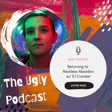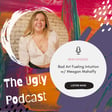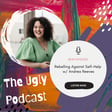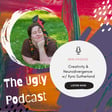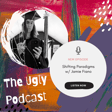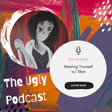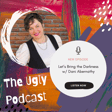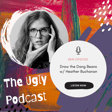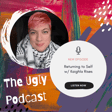Intro
Introduction and Guest Welcome
00:00:38
Jamie
fucking seafair i have all my windows closed and everything it can keep out all the traffic noise this this is the first one of the week too of course it's like right now fuckers
00:00:49
Lore Alexander
I kind of want to just leave that in the podcast because this is, it's ugly. i love it ah
00:00:56
Jamie
yep truth the ugly podcast is it you want to start over there on that
00:00:57
Lore Alexander
Welcome, everybody. Welcome to the ugly podcast.
00:01:05
Lore Alexander
Honestly, no, I like keeping stuff like that.
00:01:05
Jamie
Is it just the ugly? It's not the ugly art podcast. It's the ugly podcast. I'm sorry.
00:01:08
Lore Alexander
It's the ugly podcast.
00:01:09
Lore Alexander
No, that's, it is, it's on brand and you know, ah stuff like this happens and i think it's funny.
00:01:18
Lore Alexander
So I leave it in.
00:01:20
Lore Alexander
um Welcome everybody, welcome everybody to the Ugly
Jamie Madden's Work in Affordable Housing
00:01:23
Lore Alexander
Podcast. It's me, your host, Lore Alexander. For those of you who don't know me, i am your short, curly-haired weirdo. ah Today I've got my tattoos out and everything, um and I'm here with a great guest for you all today.
00:01:40
Lore Alexander
um My guest creates affordable housing and is the author of Bittersweet Lane, Creating Homes in the American Affordable Housing Crisis. He makes bad music because he loves it and bad watercolors because his daughter loves it.
00:01:55
Lore Alexander
And I'm so excited to introduce you. Please welcome. Introduce yourself with your name, your pronouns and what you're looking like today.
00:02:01
Jamie
All right. Thanks, Lore Thank you for having me. Jamie Madden. I like to say he and sé pronouns. Sé being the Irish language pronoun. So I like to remind people as well as messing with gender that we don't need to only relate to each other in English.
00:02:18
Lore Alexander
love that yeah absolutely
00:02:21
Jamie
And i don't know, how do I look today? I've yet to have enough morning things, but I've got my KEXP Music Heels t-shirt on to try to be on theme for thinking about how art affects our lives.
00:02:30
Lore Alexander
excellent Amazing. I love it. um i I want to just first dive in to have listeners know a little bit more about like what exactly it is that you do with affordable housing um because it's a really important thing that you do and it's a really cool.
00:02:50
Lore Alexander
I think ah not enough of us truly understand. i know we're not going to get into the nitty gritty of everything that you do, but just to kind of a brief ah overview um of what you do.
00:03:01
Jamie
Sure. Yeah. so for the last 15 years or so of my life, my work has primarily been around creating affordable housing. And what affordable housing means is homes that are restricted in price.
00:03:15
Jamie
And that might be a very low rent for very low income families. It might be a kind of medium below cost sales price for, you know, working class homeowners who wouldn't otherwise be able to afford it.
00:03:28
Jamie
It's included childcare and retail ownership and rental, all sorts of things. I've been lucky to work with some of the biggest and I'd say best nonprofits in the affordable housing development space, like the community builders and preservation of affordable housing, ah as well as small community groups, religious groups.
00:03:45
Jamie
And the role I play is project management in our field. And when I'm trying to explain it, it's like, it's the seat, that's responsible for making sure that it gets built.
00:03:58
Jamie
Because building housing is a, on one hand, really simple, right? It's literal bricks and mortar. This is not you know neurosurgery.
00:04:07
Jamie
This is not solving racism writ large. It's like, how do we find a site, get permissions to build on it? And how do we pull together the resources to direct materials and labor? but that like one sentence involves years of work and involves skills in finance. And you have some very ugly spreadsheets to go along with the ugly art.
00:04:28
Jamie
It involves working with communities and politicians. It involves working with architects and general contractors. And I don't know. I love doing this work.
00:04:39
Jamie
um This is what the book is all about. The book was meant to demystify what affordable housing is, because I'd say most of us are suffering in this current housing crisis. And it is actually as straightforward and simple as homes are the solution to homelessness.
00:04:54
Jamie
It's there in the word. I'm not sure why it confuses so many people.
00:04:58
Jamie
um You know, but the why is just as important in the book is using memoir and My childhood stories, my intergenerational family stories of housing insecurity and growing up in affordable housing.
00:05:10
Jamie
And that's why this work is a treasure for me, because I get to make a living trying to make things better for the next kid who will grow up like I did.
Perfectionism in Professional Life
00:05:19
Jamie
And I don't know, I can't ask for much more than that.
00:05:23
Lore Alexander
Absolutely. And ah you precisely summed up exactly why I wanted to have you on the podcast today. um because some people, if some people listen to this, like, oh, this is an interesting guest to have somebody who's doing like affordable housing stuff. It's not necessarily like a creative thing that you're doing. Well, I mean, it is, but in not like in the, in the way that I usually talk about on this podcast, but, um,
00:05:47
Lore Alexander
But the way that your book brings in that creativity and that human piece to it of, um you know, putting stories to this larger systemic problem, because otherwise it's just like,
00:06:02
Lore Alexander
spaces that you don't know, numbers, um statistics that can be very um ah dehumanizing.
00:06:09
Lore Alexander
And so you bring this humanization to this larger problem in our society. um And also one of the things that stood out to me um is through your, you're in your background and in the way that you navigated the system, perfectionism showed up a lot.
00:06:28
Lore Alexander
And i as I was editing your book, which this is for, I don't know if I mentioned this already. This is how we got to know each other as was the copy editor for Jamie's book. um And there were,
00:06:38
Jamie
and I still like them. That's how good of a copy editor they are. They copy edited my book and I still like them.
00:06:48
Lore Alexander
Oh, that makes me so happy. Thank you, Jamie. That is saying something. He saw all the red lines and still wants to talk to me.
00:07:01
Lore Alexander
um But one of the things that you brought up in that book was like how perfectionism manifested. um So I wonder if you can talk more about that.
00:07:10
Jamie
Yeah. And this was one of the themes that was revealed to me throughout the writing. My process was building a giant granite block of words, writing almost everything I thought I wanted to say, everything I can remember experiencing in my life that might be relevant, and then carve a book out of that.
00:07:29
Jamie
And as I was carving the book out of that, I noticed this theme, particularly in you know times of my life where there was more trauma or is more difficult. was this reaction i had to be perfect and to work incredibly hard and to be incredibly busy and i had to really reflect on like why am i doing this and what does it mean and it's an interesting duality in my own mind because if you were to ask me about perfectionism you know when i was nine years old or yesterday
00:08:02
Jamie
would say, ah, it's not possible. It's not good. It's not a good trait. You know, it holds us back. We shouldn't be like that. I was trying to think of earliest versions. And for folks who remember the 90s Nickelodeon TV show, Pete and Pete, there's this great episode where there's a guy who does everything perfectly, except they give him barbecue wings and he eats them without making any mess.
00:08:23
Jamie
And the message was, that's wrong. That's not how you're supposed to eat wings. Sure, it looks perfect, but it's the wrong way to approach wings being that neat. So this ethos of like, you don't want to be too perfect. You don't want to try to do that.
00:08:36
Jamie
But at the same time, because id grown up poor, because I wanted to go to college and you know have a decent life and all, I did have to be perfect, right? I had to make the bus on time to get to work. I had to do the job perfectly. I had to do all my schoolwork perfectly.
00:08:56
Jamie
And as this theme emerged and I'm reviewing my writing, it was kind of the sad conclusion of look at all this extra stress and anxiety and health issues that, you know, haunt me to this day that I experienced as a child chasing perfectionism.
00:09:16
Jamie
And I wasn't wrong because that's is kind of what it takes to achieve social mobility in our country these days, maybe ever, but certainly these days. And, um,
00:09:28
Jamie
You know, it's something I'd say now in my life, I'm trying really hard to unlearn and to not worry about.
00:09:34
Lore Alexander
yeah, the the systems that... we live under require perfectionism in order to to navigate those systems and to ah achieve upward mobility, um ah especially if you have ah other marginalizations to your name and existence.
00:09:55
Lore Alexander
I mean, um and so how then do you,
00:10:01
Lore Alexander
Once you've kind of grown up, you've gotten to a certain point in your life, those messages of like needing to be perfect kind of still reside in your body. Like you said, it shows up in other ways. It manifests in health problems, in um aches in your body.
00:10:21
Lore Alexander
There's so many ways that it stays with you even after you're not in those places of ah emergency survival, basic
Personal Satisfaction and Work Ethic
00:10:34
Lore Alexander
survivalism.
00:10:35
Jamie
Yeah, which is why it's been so good for me to work in the field of my central childhood traumas um and with bureaucracies every day who, you know, they are the ones that expect perfection because our system is really premised not on helping people, but on separating who is worthy of help and who is not worthy of help.
00:10:54
Jamie
And whether you're someone looking for housing or you're a sponsor or developer trying to build housing that need to prove perfect worthiness is still there. So yeah, I've continued to abuse myself by doing this work.
00:11:09
Lore Alexander
I was just going to ask, and how does that make you feel,
00:11:19
Jamie
To be honest, though, it is so worth it at the other end and whenever I've had a really tough day work wise, if I can look at one of the developments I got to work on in the past, and particularly if it's something I can visit and see kids playing outside or families walking home or whatever, it just it's all worth it.
00:11:36
Jamie
It washes it all away.
00:11:37
Lore Alexander
Yeah. Well, at the moment, that that is what we have available to us. And so,
00:11:47
Lore Alexander
like, it you as frustrating and as, like, so much rage that I'm sure is associated with that, it is still the best that the system is offering us right now.
00:12:01
Lore Alexander
And so you are still doing everything that you can to make sure that those people
00:12:06
Lore Alexander
are getting that housing and that's absolutely worthwhile. So thank you so much for the work that you're doing.
00:12:13
Jamie
Thank you. it's ah It feels like throwing water against the tide often, but I think for every individual we can help, it's the world.
00:12:23
Jamie
how many homes we could build just with the fuel they're burning up in those fighter jets right now.
00:12:28
Lore Alexander
Oh God. Mm-hmm.
00:12:30
Jamie
If you heard that one too.
00:12:34
Lore Alexander
Yeah. So how, how do you notice that perfectionism changing for you now, or as, as you grew up? um How, how does it, i guess, how do you, what's your relationship with, ah with perfectionism with creativity now?
00:12:51
Jamie
Yeah, I'd say it's much healthier. um You know, a few changes in that certainly becoming a parent is revolutionary how many of us lives our lives. And my daughter's an artist. She has made visual art every day of her life, painting, collage, markers, whatever. She loves to make things.
00:13:11
Jamie
And my mother-in-law is actually quite talented visual artist and our home is full of her paintings and things. So it, um, I love that she has that. And, you know, i just keep, I tell her, you just keep making art every day. You get to be an artist when you grow up, you get to be like how many.
00:13:26
Jamie
And, you know, that then provides something for me to do with her. And I said at the top, we do watercolors together. I really enjoy. uh,
00:13:35
Jamie
There's no point in trying to be perfect. it's Visual art is something I will never be good at. It's something I never care to be good at. And making it with my child was the first time, probably as an adult, I don't know, in a long, long time,
00:13:49
Jamie
that I did something I knew I would never be good at and just enjoyed it.
Music as Personal Growth and Expression
00:13:56
Jamie
And visual art was like never my thing. It's funny working in this field because you know obviously architects, landscape architects, civil engineers have huge roles to play in city planning and affordable housing development.
00:14:08
Jamie
So when I was in graduate school, I entered knowing how to communicate with words and numbers, but most of my professors were trained as architects who communicate almost solely in pictures.
00:14:19
Jamie
That's how their minds work. So I really had to learn how to communicate that way and start using visuals again. But it really clicked, I think, becoming a parent and letting go of the perfection and letting go of the, you know, elementary art school stuff from a child that probably made me stop drawing in the first place or what have you.
00:14:40
Lore Alexander
so making art with your daughter helps you is like a place where you don't care if you're good, you know that it's probably going to be bad and you just embrace and get into the flow of the process and whatever, whatever will be will be.
00:14:56
Jamie
Yeah, and that flow, the word you use flow, I think is is really resonant. There's an Irish artist, musician, writer, podcaster, Blind Boy Boat Club, who speaks constantly about the state of flow and how he gets into the state of flow in various ways for writing or music.
00:15:13
Jamie
And music was always one of the few things that could reliably get me into that state to the to the point where when I was drafting up the book and writing initially, I found that if I played guitar for a half hour first,
00:15:24
Jamie
I could write much more easily because I had touched that flow state.
00:15:26
Lore Alexander
Oh, I love that.
00:15:28
Jamie
But yeah, with my daughter and in watercolors, I'm able to get into flow state as well. And every once in a while, make something that i like. It's not for sharing. It's not good, but I enjoy it
00:15:38
Lore Alexander
Yeah, absolutely. that's That is truly the the message I hope to ah give to people. And I mean, I don't know if this podcast gets out to ah ah exactly which people this podcast gets out to. I know it gets out to a lot of like artists and artsy people, but truly...
00:16:00
Lore Alexander
people who don't think of themselves as creative at all, especially like I think of my dad, my dad just does not think of himself as creative. He's like, he will not pick up art supplies unless I force him But like when i am able to like invite him into the ugly art space, he's like, Oh, this is very fun. I'm like,
00:16:24
Lore Alexander
Yes, creating is fun. Just do it because it's fun and it's just an enjoyable process. It doesn't need to be like this idea that your art has to be for showing other people, for selling, for whatever.
00:16:39
Lore Alexander
It's absolute bullshit. I need people to just create.
00:16:42
Jamie
it's bullshit and it's one of those like central lies of capitalism right it's like you must monetize this
00:16:48
Jamie
if it's not perfect you can't compete you can't make money off of it don't bother And I think especially growing up poor or working class, there's just every day that messaging, you know, you're not going to become an artist, you're not writer, you're not academic, you're going to become something useful, um which not for nothing is another nice bit of working in affordable housing development is being able to explain what I do to people because they understand a job site, they understand construction in ways that, you know, if I were in, say, public policy or the arts or whatever, my family would not understand it at all at all.
00:17:22
Lore Alexander
Yeah, absolutely.
00:17:27
Lore Alexander
Yes. um Okay, so I wanted to touch more on music for you.
00:17:33
Lore Alexander
How did you get into music? You say that you make bad music. what do what do What does that mean to you? What do you enjoy doing about music?
00:17:45
Jamie
Yeah. I mean, music has been there for my soul as long as I can remember. My mother um played guitar as a teenager in the 70s and raising us in the eighty s and 90s.
00:17:59
Jamie
when she could would pull out her guitar and play for us, let us mess around with them. ah Really cheap, old, you know, imitation Les Paul, and also an acoustic guitar that had about a half inch of action above the 12th fret, which, you know, for my childhood fingers was just not gonna happen.
00:18:17
Jamie
And she eventually sold those guitars to buy me Mexican-made Stratocaster, a Fender Stratocaster when I was 12. And I'd been playing trumpet, you know fourth grade school band kind of thing, and enjoyed that.
00:18:30
Jamie
Picked up guitar later on, picked up bass, playing with friends. Probably from the age of 14, was taking the tea into Boston and going to punk shows and ska shows and all sorts of DIY underground music and really found my soul then.
00:18:46
Jamie
I'd started drinking in seventh grade, but by ninth grade I could stop because I had music and I had it there every weekend and the indie kind of DIY scene, particularly the all ages scene in Boston at the time was very straight edge and not out of um like ideology or
00:19:05
Jamie
you know you should live this way it was like we kept losing venues because the cops would come if someone was drinking or using drugs or whatever and we didn't want to lose the venues um so it was just this great place to carry me through and uh folks can read the book if you want to learn about my childhood and teenage traumas but there were a lot of them and Music really helped me process through that. And it's never left.
00:19:27
Jamie
I've had times when I've played more and played less. ah College was tough. I went to Swarthmore College, which was wonderful. But, you know, it's an elite institution. It's one of the hardest schools to get into in the country.
00:19:39
Jamie
And it's one of these schools where it's not... you're not going so you can network and make connections like some of the ivs it's really a bunch of nerds who are there to do what they're doing as hard as they can do it for knowledge or for art's own sake but for a mediocre musician that was kind of killer because i'm like oh my god these people i can't play with any of these people they're too good it's too much and the rest of it was too hard anyway so i kind of
00:20:06
Jamie
you know, lost this trajectory I'd been on for, know, all of my teenage years and some of my childhood. And it really took till then I was in my 20s, my 30s as a professional, having some free time, having a couple of dollars to get equipment and play.
00:20:26
Jamie
And it was you know just something I did in my room. And as I found myself playing on my own, which again is that like lack of confidence that perfectionism can put into to us, I would only play for myself. And then I started singing and I cannot carry a tune.
00:20:42
Jamie
My wife has a perfect pitch and it drives her fucking insane. I cannot carry a tune. But like I'll play and sing for myself and just had never found that before and found it to be just so cathartic, so good for my mental health, so good for my creativity and my ability to relate to people and just keep going in life.
00:21:01
Jamie
So it's always been there for me. um then I'd say in the last decade or so, have had a lot more fun playing with people, you know, and particularly in trips to Ireland or hanging out with musician friends, just having a session at the end of the night. And I've got myself good enough. I can hold my own in a session, you know, give me ah a guitar or a tin whistle or a bass and,
00:21:20
Jamie
know, it won't be terrible. It might be ugly, but it won't be terrible. It's good fun.
00:21:24
Jamie
And yeah, I've been trying to instill that in my daughter and her friends.
Creativity in Childhood and Parenting
00:21:28
Jamie
She's much more of a visual arts kid, but she'll play music with me now and then. we can get into a good groove. And I've got this little alcove in my apartment I call the Belltown Music Hall, and it's got all the instruments. And whenever a kid is over, if a little kid asks me, can I try can i try that? Can I try the trumpet, the bass, the keyboard, whatever?
00:21:47
Jamie
Yeah, let's pull it down. And yeah, had to amend the rule for the tin whistles, three five-year-olds playing tin whistle is not survivable. But otherwise it's just, I love them to find fun in it.
00:21:58
Lore Alexander
You got to have limits.
00:22:00
Jamie
And you know, this is a conversation, the conversation i'm having with you about this stuff is a conversation I have with my wife a lot because I mentioned she has an incredible ear. She also also was in violin lessons from the age of four in a really competitive kind of conservatory environment in Maryland.
00:22:18
Jamie
And by the time I'd met her as an adult, she had all this skill and talent for music and no love, like just trauma, really.
00:22:27
Jamie
um And i so the flip side of that, where I've got nothing but love and very little talent or skill. And so we talk about how do we you know not pass on our traumas to our child and how do we help make her life better?
00:22:40
Jamie
And this is one of those places of just... encouraging the creativity and just letting it be there to play and for self-expression and for connecting with friends and not being something that she has to be perfect at or has to be super good.
00:22:58
Jamie
You know, she's already got a little bit of a better ear than me. So there's hope.
00:23:02
Lore Alexander
Oh, that's so sweet. I love that you're doing that and providing that environment for your kid. It's a really beautiful thing. i also had, i I had that experience of my parents made me play piano.
00:23:16
Lore Alexander
And because it was kind of a requirement, I think everything in my little rebellious brain was like, no, I don't want to. But I wanted, and wanted to learn how to play guitar.
00:23:28
Lore Alexander
and they said I couldn't play guitar until I learned how to play piano. And so I had to do two years of piano and every second of it just felt forced. And I just hated it.
00:23:41
Lore Alexander
I was, just I was ah begrudging process from start to finish.
00:23:45
Lore Alexander
And then even to the point where ah once I was doing guitar lessons, I think I had associated playing music just with misery. And so even when I started playing guitar, I was just like, well, don't want to do this either.
00:23:56
Lore Alexander
Like I just, I don't know.
00:23:57
Jamie
But you could you can find some nice misery to play, you know, have a goth guitar phase.
00:24:03
Lore Alexander
Absolutely. I i mean, i and I think a lot of it, too, was it was also like the perfectionism. Like I didn't pick up guitar very quickly.
00:24:10
Lore Alexander
My fingers didn't move very well, very fast. And because it wasn't something that I picked up quickly, it was just like, OK, well, clearly that's not for me. i have i I'm very much that that person who grew up where things either came really easy to me, um in which case I was just like, oh, yeah, this is great.
00:24:28
Lore Alexander
And then I'd do it. Or if it came with any kind of struggle, it was just like, well, clearly that's not in the cards, which now as an adult, I'm like, oh, I wish I had just kind of played around and like stayed in that novice phase, you know, just allowed myself to be bad for a while and just get curious about what that offers.
00:24:49
Jamie
Yeah. You know, it's interesting. I've um actually gone through the process twice again in the last few years because I've had this string of injuries and and such um had really severe carpal tunnel pain in both hands and did that working class toxic masculinity thing where I'll just work through the pain. I got work to do.
00:25:10
Jamie
I'll see a doctor later.
00:25:11
Lore Alexander
Mm-hmm. Mm-hmm.
00:25:11
Jamie
And it got to the point where like, you know, neuropathic pain was from my fingertips to my shoulder and waking me up in the mornings and decided to write a book with severe carpal tunnel, which was a great decision.
00:25:23
Jamie
But the point is, um I had to stop playing guitar and bass and pretty much everything. ah Tin whistle still worked, which is probably when I picked it up. But I completely had to stop for about a year because I tried non-surgical stuff for a year.
00:25:40
Jamie
Eventually had the surgeries and I'm like, oh, I can play again. So I learned to play again. Then I hurt the tendons in my wrists and elbows bad enough that I couldn't play again.
00:25:52
Jamie
And had to learn over again. The second time wasn't as bad. The first time was a real struggle. It was really going from like zero and teaching myself to play again. And I'd had a trip to Ireland planned for post pandemic and was staying with a musician friend. I'm like, i know there's going to be sessions.
00:26:07
Jamie
Got to be able to at least play by then. So this great goal and went through that process of like learning how again and trying to figure out like,
00:26:16
Jamie
how to let go of perfection, how to let go of self-criticism, you know getting better at when mistakes happen, using them and playing with them instead of letting it interrupt me or back me up, which I think is really important thing as a musician, especially if you're not very good like me. um you know And then that relearning a one time, when had to relearn the second time over the last year has been there.
00:26:39
Jamie
And i don't know, in a some way it makes music even more precious to me because I had to fight to get it back. And so now it's like, I never, never, never want to let this go again I can help it.
00:26:50
Lore Alexander
Yeah, absolutely. That's something that my my partner is struggling with right now is she's coming. We just got all of her ah instruments back from Colorado last month. um She finally like moved all of her stuff up here to Tacoma.
00:27:05
Lore Alexander
And so now she has everything back and she's like, I haven't touched these for three years.
00:27:11
Lore Alexander
And she's so scared to get started. so much of that perfectionism and like, I'm just like, not, I'm not good. And like, was I ever good?
00:27:20
Lore Alexander
And it's just like, oh, just want you to enjoy the thing that you like doing.
00:27:28
Lore Alexander
Yeah. I want to kind of step into talking about resistance a little bit because
Art, Resistance, and Emotional Expression
00:27:36
Lore Alexander
creativity and resistance, I feel like just go right hand in hand.
00:27:41
Lore Alexander
um But while we do that, would you like to make some ugly art together?
00:27:45
Jamie
sure Sure, I've got a watercolor book. I think this was Father's Day gifts. I got a little water eat nice watercolor paper and some watercolor brush pens.
00:28:00
Lore Alexander
Great. Do you, ah ah would you like a prompt to get you started?
00:28:06
Lore Alexander
Okay. um I think because it's been fun to just like talk about music and stuff. I wonder if we can combine these a little bit and do a watercolor of musical instruments.
00:28:19
Lore Alexander
How does that sound?
00:28:20
Jamie
um Hold on. This sounds good, but I've got one to show off because I can show you what the wall looks like my Belltown Music Hall.
00:28:30
Lore Alexander
Ooh, amazing. oh incredible. He's holding up a a painting that he's already done of all the different instruments that he has on his walls.
00:28:36
Jamie
so Yeah. yeah Very bad watercolor done a while ago, but I love it.
00:28:40
Lore Alexander
That's so good.
00:28:43
Lore Alexander
Perfect. All let's add a twist to that. I want it to be...
00:28:49
Lore Alexander
Your instruments, having a conversation together.
00:28:53
Jamie
Alright, I'll figure something out.
00:28:55
Lore Alexander
and interacting with one another.
00:28:56
Jamie
I'll figure something out.
00:29:00
Lore Alexander
right. um And if you're able to talk whilst painting, amazing.
00:29:09
Lore Alexander
But yeah, I would love to know what role you see art playing in resistance under the current And, I mean, long-standing regimes we've been under.
00:29:21
Jamie
Yeah. Yeah. You know, in the longstanding bit, it's funny in my book, and ends up being that because I wanted to understand the origin of intergenerational poverty in my own family lines and the origins of housing insecurity and homelessness in America.
00:29:37
Jamie
And the two things kind of collided 400 years ago in know the conquest and colonization of Ireland by Cromwell and the British and such. And art has always, always, always been.
00:29:52
Jamie
a part of Irish culture going way back before colonialism. The the poets, artists, keepers of knowledge and lore were held in as much esteem as the highest warriors or the most wealthy farmers and such.
00:30:05
Jamie
But you know famously, we've got lots and lots of music and other art that has um kept our histories and allowed us to pass on our histories when a lot of history books in the United States and the UK don't or frankly write over it with false stuff.
00:30:25
Jamie
And, you know, and has also covered not just sort of what happened, but how it felt, you know, like I can sing the fields of Athenry or four green fields and feel that.
00:30:25
Lore Alexander
Mm-hmm. Mm-hmm.
00:30:38
Jamie
And especially now living in Seattle where I'm the colonizer living on someone else's fourth green field.
00:30:46
Jamie
Really feeling that and before green fields happens to be a song that my daughter likes me to sing for her. She likes me to sing to her, especially at bedtime sometimes. And the way that music and art generally can help us teach the next generation about the world and about what has happened before they got here and how it affects us and how it feels and what our responsibilities to that are before they have the you know intellectual capacity or history or literacy to go at it that way. i feel like music is really, really important for
00:31:20
Jamie
that bit of it. So I think music, art generally, and resistance have always been linked in my mind, just because like of being lucky enough to grow up Irish in Boston and having that culture there all the time and knowing that that's what the culture was for.
00:31:40
Jamie
And, you know, in the last decade or so, there's been almost a cultural Boy, saying cultural revolution, those two words in a row doesn't come right after spending time in China.
00:31:51
Jamie
But a big shift in the culture in the Republic of Ireland, well, in Ireland generally, um where young people are making new types of resistance art, um not just about our colonialism in the past or forced starvation in the past.
00:32:07
Jamie
The forced starvation happening right now. Irish artists are very focused on helping Palestine. Language revitalization. People are making art with the Irish language. Bands like Necap and Fontaine's DC and Bird and many, many others are using the Irish language in all sorts of new forms of music.
00:32:26
Jamie
And that is language revival, right? Language is alive if young people are making art with it. um So it's been incredible, you know, as part of the diaspora watching this happen and watching, you know, elements of the culture that I was raised in.
00:32:41
Jamie
finding purchase in a new generation that's using it to fight for their rights to housing, you know, to fight against genocide and colonialism, to fight for the, you know, nothing short of the rebirth of their culture.
00:32:52
Jamie
So it's, our yeah, art and resistance has always been very, very tied in my mind.
00:32:59
Lore Alexander
It's so beautiful. I love how you bring in the history element to it. I think i I definitely grew up feeling pretty disconnected from history and my own history.
00:33:14
Lore Alexander
And so learning about it as an adult and especially regaining connection to land through that process, I think art really helps us reconnect to land in ways that we adults ah people who, you know, as
00:33:39
Lore Alexander
Colonizers, thank you. That was the word I was looking for. As, like, colonizers, we lose that and... reconnecting to land through art, through music, through passing down knowledge and history.
00:33:56
Lore Alexander
i think it helps us grieve in a way that we really need to do in order to find that reconnection, in order to stop perpetuating cycles.
00:34:06
Lore Alexander
Access to grief, I think, is one thing that art really helps us do. helps us do
00:34:14
Jamie
Yeah. I mean, in any emotion too, right? Like for myself, music has always been the way I try to regulate my emotions.
00:34:17
Lore Alexander
Mm-hmm. Mm-hmm.
00:34:22
Jamie
I've got, you know, albums and playlists for every mood and it really does help me. And again, you know, raised in a working class Boston Irish masculinity,
00:34:33
Jamie
ah emotional literacy and feelings and that sort of thing, not exactly encouraged.
00:34:38
Jamie
And I think music really provides us with the ability to access that. And I've seen it, you know, with people who would never admit to crying or showing an emotion, but they can do it with music.
00:34:51
Lore Alexander
yeah absolutely art is so healing and so necessary this picture is ridiculous
00:35:05
Lore Alexander
I'm loving it alright okay
00:35:11
Lore Alexander
Regarding your writing your book. So any ah tips for your past self other than maybe don't write a book when you have carpal tunnel?
00:35:22
Jamie
Carpool tunnel. I wouldn't even do that. You know, as much as working through the paint has continued to wreck me, it is also something that's made a lot possible.
00:35:33
Lore Alexander
Absolutely.
00:35:33
Jamie
And this was the right time, even if um my health didn't make it the right time for this book.
00:35:39
Jamie
um You know, one thing that I came to in the writing process that wouldn't have really occurred to me beforehand was...
00:35:50
Jamie
A, the value of imitating. I think this is, you know, on the theme of ugly art and perfectionism, especially as a 90s kid, you know, you were supposed to not take lessons, you know, learn your instrument from the ether, and then make music that expresses you originally. And, you know, no one else came from it. And that's bullshit.
00:36:09
Jamie
and It's always been bullshit, but it was bullshit.
00:36:11
Jamie
We were fed in the And... and I found what was really, really useful for me whenever I hit writer's block was if I listened to music that hit the topic or hit the mood of what I knew I wanted to write about that day, i could pull lines. I could pull a verse, say, let me, you know, I'll start with John Darnielle from the Mountain Goats lyrics, and that'll give me the rhythm and the tone and the tenor and the feelings and then, you know, expand and revise, expand and revise, expand and revise until I've left a nugget in there for Mountain Goats fans to see where something came from.
00:36:53
Jamie
But is my own at that point. And the use of music to write in that way ended up being really, really useful for me and was something I did not expect to have happened at all.
00:37:07
Lore Alexander
Yeah. I love that. I think, yeah, the the idea that you have to be unique and that you have to say things all the way the first time, like you have to be the first one to ever come up with this genius idea.
00:37:19
Lore Alexander
Otherwise, why would you write it down in the first place? That's such a silly concept.
00:37:23
Jamie
It's not how it works.
00:37:25
Lore Alexander
No, it's not.
00:37:25
Jamie
It's not how it works.
00:37:26
Lore Alexander
That's not how it works at all. ah Especially when it comes to like music. I mean, all of the the musical combinations mathematically are already exist.
00:37:42
Lore Alexander
And it's up to us to like, you put them in your own way and you put them on your own emphasis and you combine them in your own do way.
00:37:51
Lore Alexander
Like it's, It's unique because it's you, not because it hasn't come before or someone hasn't done something similar. You as a person are the unique the uniqueness that is added to the art.
00:38:03
Lore Alexander
um So absolutely say it again um and start with that.
00:38:08
Jamie
Imitation is not a bad place to start.
00:38:10
Lore Alexander
It's not, it's ah it's a great place to start.
00:38:15
Lore Alexander
Love that.
00:38:18
Lore Alexander
All right, let's see what you made.
00:38:21
Jamie
Ah, still in process, but I've made it this far.
00:38:25
Lore Alexander
Excellent.
00:38:28
Lore Alexander
see the trumpet is hollering.
00:38:32
Jamie
that's what they do.
00:38:32
Lore Alexander
so great. Perfect. um Here's what I created. It is piano mouth with giant eyeballs and whatever else.
00:38:47
Jamie
yeah Is it being friendly or is it terrifying you?
00:38:50
Lore Alexander
ah it kind of It's a little terrifying. It kind of reminds me of those um those big like Chuck E. Cheese animatronics.
00:38:58
Lore Alexander
that's kind of That's kind of the vibe it's giving me. I kind of hate it.
00:39:00
Jamie
Yeah. Yeah. It's back with your piano lessons. It's not saying come play me.
00:39:06
Lore Alexander
It's not saying come play me. I have been interested in ah playing playing piano im just like ah with my ugly art approach and seeing like what is and do I find it fun if I am approaching it from this like whatever comes out comes out type of mentality.
00:39:24
Lore Alexander
So I'm going to try that.
00:39:25
Jamie
Yeah, that's part of the privilege of playing with children, playing music with children, because you know it's going to be ugly.
00:39:29
Lore Alexander
Yes. Oh, absolutely.
00:39:32
Jamie
And like you know there are moments when like I'm able to you know put the right bass line underneath or the right chord changes and let them go, and they're just banging away at the piano or whatever instrument they've chosen.
00:39:48
Jamie
but they'll get into a rhythm, like, and it will work and they'll find some harmony here and there and it will be ugly, but they'll get there. And there's these magical, magical moments where it just starts flowing.
00:39:59
Jamie
And, you know, I could maybe get there on my own, but playing with children certainly beats back the anxiety of perfectionism and allows just the fun to come forward.
Writing Process and Embracing Imperfection
00:40:11
Lore Alexander
It's so good. love that you have that.
00:40:14
Lore Alexander
Well, any last parting thoughts ah that that you'd like to touch on before we close out?
00:40:24
Jamie
I think it's interesting that as a copy editor, your' ah you know have this podcast kind of arguing against perfection. That's a contradiction you could probably spend hours speaking about.
00:40:37
Lore Alexander
Absolutely.
00:40:38
Jamie
And I'm highlighting it just to say, you know, there are places. Good art has its place. I'm pretty sure the book is good. I think it's good art. I hope people will check it out.
00:40:47
Lore Alexander
It's, yeah.
00:40:48
Jamie
It'll be available this November. um oh and from Row House Books, which is my publisher. They are absolutely incredible. Everyone they've brought in to work on this project has been the right people for the book that's being written.
00:41:04
Jamie
And it's this amazing best of both worlds where I'm getting the morals and values and attention of an independent publisher, but the distribution potential of a major.
00:41:16
Jamie
um And I love them. And I'm going to shout them out for anyone out there who's making bad art with words um or children's books or anything like that. Check out Row House Books. Submit.
00:41:27
Jamie
doesn't hurt to submit. You'll get rejected. Everyone gets rejected. Collect a billion rejections when you're writing a book. But I just encourage people to start trying in the spirit of that. And there are...
00:41:38
Jamie
not just people, but, you know, institutions, businesses, publishing houses that might find a home for your art and might help you transform art that is far, far, far from what you would think of as perfect into something you really love.
00:41:52
Jamie
So just keep making the art. Don't stop. And, uh, It's hard. I'm shy. It's hard for me to reach out and find community for it, but it's so, so worth it every time I have. And, you know, if you're sitting somewhere with headphones on doing something to yourself that will never see the light of day, I'd encourage you just to consider about maybe it does need to see the light of day.
00:42:13
Jamie
And if we can lose our anxiety and our egos around being embarrassed, if it, if it's not perfect or if it looks bad, then I don't know, we can all make more art.
00:42:23
Jamie
And as we said, Resistance and culture and keeping our stories and our spirits alive really depends on that.
00:42:31
Lore Alexander
Absolutely.
Closing Thoughts and Encouragement
00:42:32
Lore Alexander
Thank you, Jamie. That's beautiful.
00:42:36
Lore Alexander
Everybody, please check out Jamie's book, Bittersweet Lane. ah You can get it, I think, wherever books are found.
00:42:43
Jamie
Wherever books are sold, that's right.
00:42:45
Lore Alexander
Yeah. ah Very exciting. um Yes, absolutely. Shout out to Row House. They're an excellent client. And I'm so glad that I got to connect with you um through your book and um and since then.
00:42:57
Lore Alexander
So this has been lovely. Thank you again for being here.
00:43:04
Lore Alexander
All right, everybody. Thank you so much for listening. As always, keep it ugly.
Outro






